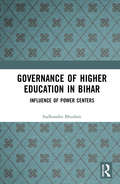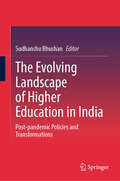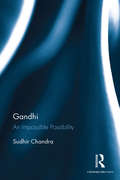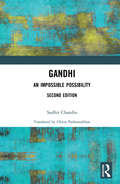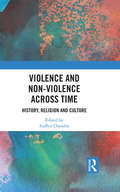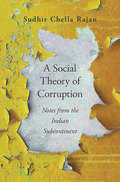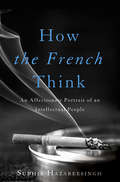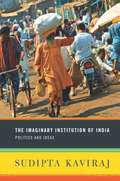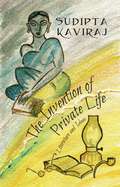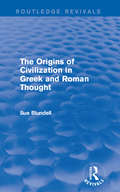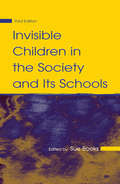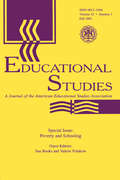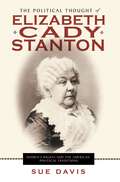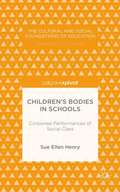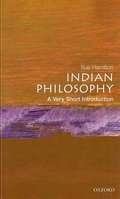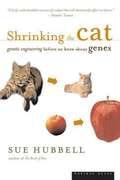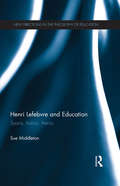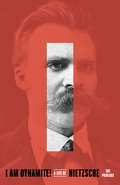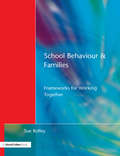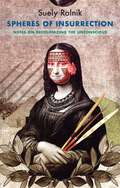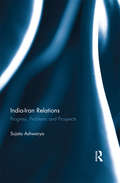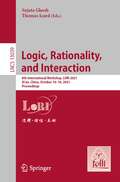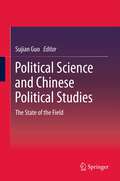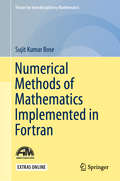- Table View
- List View
Governance of Higher Education in Bihar: Influence of Power Centers
by Sudhanshu BhushanThis book presents the state-specific dimensions of the governance of higher education in Bihar, India, based on a real-case perspective. It discusses the policies of the center and state governments, and their implications on the state's higher education system. It addresses the issues and challenges faced by the higher education sector from the point of view of multiple stakeholders at center, state, university and college levels, while examining influential power centers. The volume focuses on select universities in the state and looks at how they manage policies, schemes and regulations. It deals with key themes such as the role of state and regulatory bodies such as the University Grants Commission; the balance of power; resource scarcity; the inadequacy of top-down governance models; governance failure; and the autonomy of universities. It explores the conflict between the politics and economics of governance and efficiency; the promotion and recruitment of senior office-bearers and teachers; the privatization of colleges; and financing, admission and examination systems. Through an in-depth study using empirical unit-level data from the All-India Survey of Higher Education, examples and theoretical frameworks, the book analyzes the reasons for the underperformance of the governance system of higher education in Bihar. It also offers suggestions and policy recommendations to help improve its planning and management via participative and responsible governance and informed institutional leadership. This book will be of interest to students, teachers and researchers of education, higher education, economics, governance and public administration, and development studies. It will also be useful to educationists and experts, education administrators, policymakers, bureaucrats and the governing bodies of higher education institutions.
The Evolving Landscape of Higher Education in India: Post-pandemic Policies and Transformations
by Sudhanshu BhushanThe edited volume discusses the long period of post-colonial developments in higher education in India. It examines the legitimacy of the policies pursued post-pandemic with a focus on the role of teachers and the students' voices. It addresses the essential question of how the technological ascendance in higher education addresses social justice. What is the role of teachers in a new landscape of higher education? It offers insights into the efficiency-centric proposition of the state-market-technology triad, the current paradigm of higher education worldwide. It presents evidence to understand how efficiency has a tradeoff with various aspects of social justice. The authors deal with questions, such as the challenges of privatization and how the commodification of higher education runs counter to the idea of inclusive higher education. The authors critically look at the online form of higher education and how it has led to the shrinkage of democratic spaces in higher education. It discusses the transformative role of teachers with increasing managerialism of higher education. The book highlights a deep understanding of the increasing role of the market and technology and their influence in negating an inclusive and democratic public space in higher education. It appeals to teachers and students by enabling them to understand the market's and technology's impacts on higher education. It has the potential to be a reference book in colleges and universities. It will help the large community of practitioners and policymakers guard against the dangers of overt marketization. The book benefits policymakers, university administrators and teachers, and researchers of higher education interested in governance, technology, teaching, and research in higher education.
Gandhi: An Impossible Possibility
by Sudhir ChandraFor a man who made such a powerful intervention in the history of the 20th century, many of Mahatma Gandhi’s ideas were misunderstood or obfuscated during his lifetime. This book draws our attention to Gandhi’s last years, particularly the marked change in his understanding of the acceptance of non-violence by Indians. It points to a startling discovery Gandhi made in the years preceding India’s Independence and Partition: the struggle for freedom which he had all along believed to be non-violent was in fact not so. He realised that there was a causal relationship between the path of illusory ahimsa which had held sway during the freedom struggle and the violence that erupted thereafter during Partition. Calling for a serious rethink on the very nature and foundation of modern India, this book throws new light on Gandhian philosophy and its far-reaching implications for the world today. It will interest not only scholars and researchers of modern Indian history, politics, and philosophy but also lay readers.
Gandhi: An Impossible Possibility
by Sudhir ChandraGandhi was perhaps the most influential yet misunderstood figure of the twentieth century. Drawing close attention to his last years, this book explores the marked change in his understanding of the acceptance of non-violence by Indians. It points to a startling discovery Gandhi made in the years preceding India’s Independence and Partition: the struggle for freedom which he had all along believed to be non-violent was in fact not so. He realised that there was a causal relationship between the path of illusory ahimsa, which had held sway during the freedom struggle, and the violence that erupted thereafter during Partition. In the second edition of this much-acclaimed volume, Chandra revisits Gandhi’s philosophy to explain how and why the phenomenon of the Mahatma has been understood and misunderstood through the years. Calling for a rethink of the very nature and foundation of modern India, this book throws new light on Gandhian philosophy and its far-reaching implications for the world today. It will interest not only scholars and researchers of modern Indian history, politics and philosophy, but also lay readers.
Violence and Non-Violence across Time: History, Religion and Culture
by Sudhir ChandraThis book probes the complex interweaving, across time and cultures, of violence and non-violence from the perspective of the present. One of the first of its kind, it offers a comprehensive examination of the interpenetration of violence and non-violence as much in human nature as in human institutions with reference to different continents, cultures and religions over centuries. It points to the present paradox that even as violence of unprecedented lethality threatens the very survival of humankind, non-violence increasingly appears as an unlikely feasible alternative. The essays presented here cover a wide cultural–temporal spectrum — from Vedic sacrifice, early Jewish–Christian polemics, the Crusades, and medieval Japan to contemporary times. They explore aspects of the violence–non-violence dialectic in a coherent frame of analysis across themes such as war, jihad, death, salvation, religious and philosophical traditions including Buddhism, Christianity, Judaism, Hinduism, Islam, mysticism, monism, and Neoplatonism, texts such as Ramayana, Mahabharata and Quran, as well as issues faced by Dalits and ethical imperatives for clinical trials, among others. Offering thematic width and analytical depth to the treatment of the subject, the contributors bring their disciplinary expertise and cultural insights, ranging from the historical to sociological, theological, philosophical and metaphysical, as well as their sensitive erudition to deepening an understanding of a grave issue. The book will be useful to scholars and researchers of history, peace and conflict studies, political science, political thought and cultural studies, as well as those working on issues of violence and non-violence.
A Social Theory of Corruption: Notes From The Indian Subcontinent
by Sudhir Chella RajanA social theory of grand corruption from antiquity to the twenty-first century.In contemporary policy discourse, the notion of corruption is highly constricted, understood just as the pursuit of private gain while fulfilling a public duty. Its paradigmatic manifestations are bribery and extortion, placing the onus on individuals, typically bureaucrats. Sudhir Chella Rajan argues that this understanding ignores the true depths of corruption, which is properly seen as a foundation of social structures. Not just bribes but also caste, gender relations, and the reproduction of class are forms of corruption.Using South Asia as a case study, Rajan argues that syndromes of corruption can be identified by paying attention to social orders and the elites they support. From the breakup of the Harappan civilization in the second millennium BCE to the anticolonial movement in the late nineteenth and early twentieth centuries, elites and their descendants made off with substantial material and symbolic gains for hundreds of years before their schemes unraveled.Rajan makes clear that this grander form of corruption is not limited to India or the annals of global history. Societal corruption is endemic, as tax cheats and complicit bankers squirrel away public money in offshore accounts, corporate titans buy political influence, and the rich ensure that their children live lavishly no matter how little they contribute. These elites use their privileged access to power to fix the rules of the game—legal structures and social norms—benefiting themselves, even while most ordinary people remain faithful to the rubrics of everyday life.
How The French Think: An Affectionate Portrait Of An Intellectual People
by Sudhir HazareesinghIn France, perhaps more so than anywhere else, intellectual activity is a way of life embraced by the majority of society, not just a small group of élite thinkers. And because French thought has also shaped the Western world, Sudhir Hazareesingh argues in How the French Think, we cannot hope to understand modern history without first making sense of the French mind-set. Hazareesingh traces the evolution of French thought from Descartes and Rousseau to Sartre and Derrida. In the French intellectual tradition, he shows, recurring themes have pervaded nearly every aspect of French life, from the rhetorical flair once embodied by the philosophes to the country’s modern embrace of secularism. Sweeping aside generalizations and easy stereotypes, Hazareesingh offers an erudite portrait of the venerated tradition of French thought and the people who embody it.
The Imaginary Institution of India: Politics and Ideas
by Sudipta KavirajFor decades Sudipta Kaviraj has worked with and improved upon Marxist and subaltern studies, capturing India's social and political life through its diverse history and culture. While this technique has been widely celebrated in his home country, Kaviraj's essays have remained largely scattered abroad. This collection finally presents his work in one convenient volume and, in doing so, reasserts the brilliance of his approach.As evidenced in these essays, Kaviraj's exceptional strategy positions Indian politics within the political philosophy of the West and alongside the perspectives of Indian history and indigenous political thought. Studies include the peculiar nature of Indian democracy; the specific aspects of Jawaharlal Nehru's and Indira Gandhi's regimes; political culture in independent India; the construction of colonial power; the relationship between state, society, and discourse; the structure of nationalist discourse; language and identity formation in Indian contexts; the link between development and democracy, or democratic functioning; and the interaction among religion, politics, and modernity in South Asia. Each of these essays explores the place of politics in the social life of modern India and is powered by the idea that Indian politics is plastic, reflecting and shaping the world in which people live.
The Invention of Private Life: Literature and Ideas
by Sudipta KavirajThe essays in this volume, which lie at the intersection of the study of literature, social theory, and intellectual history, locate serious reflections on modernity's complexities in the vibrant currents of modern Indian literature, particularly in the realms of fiction, poetry, and autobiography. Sudipta Kaviraj shows that Indian writers did more than adopt new literary trends in the nineteenth and twentieth centuries. They deployed these innovations to interrogate fundamental philosophical questions of modernity. Issues central to modern European social theory grew into significant themes within Indian literary reflection, such as the influence of modernity on the nature of the self, the nature of historicity, the problem of evil, the character of power under the conditions of modern history, and the experience of power as felt by an individual subject of the modern state. How does modern politics affect the personality of a sensitive individual? Is love possible between intensely self-conscious people, and how do individuals cope with the transience of affections or the fragility of social ties? Kaviraj argues that these inquiries inform the heart of modern Indian literary tradition and that writers, such as Bankimchandra Chattopadhyay, Rabindranath Tagore, and Sibnath Sastri, performed immeasurably important work helping readers to think through the predicament of modern times.
The Origins of Civilization in Greek and Roman Thought (Routledge Revivals)
by Sue BlundellIt has been much disputed to what extent thinkers in Greek and Roman antiquity adhered to ideas of evolution and progress in human affairs. Did they lack any conception of process in time, or did they anticipate Darwinian and Lamarckian hypotheses? The Origins of Civilization in Greek and Roman Thought, first published in1986, comprehensively examines this issue. Beginning with creation myths – Mother Earth and Pandora, the anti-progressive ideas of the Golden Age, and the cyclical theories of Orphism – Professor Blundell goes on to explore the origins of scientific speculation among the Pre-Socratics, its development into the teleological science of Aristotle, and the advent of the progressivist views of the Stoics. Attention is also given to the ‘primitivist’ debate, involving ideas about the noble savage and reflections of such speculation in poetry, and finally the relationship between nature and culture in ancient thought is investigated.
Invisible Children in the Society and Its Schools (Sociocultural, Political, and Historical Studies in Education)
by Sue BooksThe authors in this book use the metaphors of invisibility and visibility to explore the social and school lives of many children and young people in North America whose complexity, strengths, and vulnerabilities are largely unseen in the society and its schools. These “invisible children” are socially devalued in the sense that alleviating the difficult conditions of their lives is not a priority—children who are subjected to derogatory stereotypes, who are educationally neglected in schools that respond inadequately if at all to their needs, and who receive relatively little attention from scholars in the field of education or writers in the popular press. The chapter authors, some of the most passionate and insightful scholars in the field of education today, detail oversights and assaults, visible and invisible, but also affirm the capacity of many of these young people to survive, flourish, and often educate others, despite the painful and even desperate circumstances of their lives. By sharing their voices, providing basic information about them, and offering thoughtful analysis of their social situation, this volume combines education and advocacy in an accessible volume responsive to some of the most pressing issues of our time. Although their research methodologies differ, all of the contributors aim to get the facts straight and to set them in a meaningful context. New in the Third Edition: Chapters retained from the previous edition have been thoroughly revised and updated, and five totally new chapters have been added on the topics of:*young people pushed into the “school-to-prison” pipeline; *the “environmental landscape” of two out-of-school Mexican migrant teens in the rural Midwest;*the perceptions and practices, in and outside schools, that construct African American boys as school failures;*negative portrayals of blackness in the context of understanding the “collateral damage of continued white privilege”; and *working-class pregnant and parenting teens’ efforts to create positive identities for themselves. Of interest to a broad range of researchers, students, and practitioners across the field of education, this compelling book is accessible to all readers. It is particularly appropriate as a text for courses that address the social context of education, cultural and political change, and public policy, including social foundations of education, sociology of education, multicultural education, curriculum studies, and educational policy.
Poverty and Schooling: A Special Issue of Educational Studies
by Valerie Polakow Sue BooksFirst published in 2001. Routledge is an imprint of Taylor & Francis, an informa company.
The Political Thought of Elizabeth Cady Stanton: Women's Rights and the American Political Traditions
by Sue Davis2009 Choice Outstanding Academic TitleElizabeth Cady Stanton (1815-1902) was not only one of the most important leaders of the nineteenth century women’s rights movement but was also the movement’s principal philosopher. Her ideas both drew from and challenged the conventions that so severely constrained women’s choices and excluded them from public life.In The Political Thought of Elizabeth Cady Stanton, Sue Davis argues that Cady Stanton’s work reflects the rich tapestry of American political culture in the second half of the nineteenth century and that she deserves recognition as a major figure in the history of political ideas. Davis reveals the way that Cady Stanton’s work drew from different political traditions ranging from liberalism, republicanism, inegalitarian ascriptivism, and radicalism. Cady Stanton’s arguments for women’s rights combined approaches that in contemporary feminist theory are perceived to involve conflicting strategies and visions. Nevertheless, her ideas had a major impact on the development of the varieties of feminism in the twentieth century. Thoroughly researched and engagingly written, The Political Thought of Elizabeth Cady Stanton draws on a wide variety of primary and secondary sources and promises to fill a gap in the literature on the history of political ideas in the United States as well as women’s history and feminist theory.
Children’s Bodies in Schools: Corporeal Performances of Social Class
by Sue Ellen HenryBringing together sociology of the body with powerful examinations of educational theory and social class, Henry examines how children's experiences of school and pedagogy are shaped by their bodies and the ideas of social class and class identity that their bodies carry.
Indian Philosophy: A Very Short Introduction
by Sue HamiltonIndia has a long, rich, and diverse tradition of philosophical thought, spanning some two and a half millennia and encompassing several major religious traditions. This Very Short Introduction emphasizes the diversity of Indian thought, and is structured around six schools which have achieved classic status. Sue Hamilton explores how the traditions have attempted to understand the nature of reality in terms of an inner or spiritual quest, and introduces distinctively Indian concepts such as karma and rebirth. She also shows how Indian thinkers have understood issues of reality and knowledge -- issues which are also an important part of the Western philosophical tradition.
Shrinking the Cat: Genetic Engineering Before We Knew About Genes
by Sue HubbellIn this timely and controversial work, Sue Hubbell contends that the concept of genetic engineering is anything but new, for humans have been tinkering with genetics for centuries. Focusing on four specific examples -- corn, silkworms, domestic cats, and apples -- she traces the histories of species that have been fundamentally altered over the centuries by the whims and needs of people.
Henri Lefebvre and Education: Space, history, theory (New Directions in the Philosophy of Education)
by Sue MiddletonDuring his lifetime Henri Lefebvre (1901-1991) was renowned in France as a philosopher, sociologist and activist. Although he published more than 70 books, few were available in English until The Production of Space was translated in 1991. While this work - often associated with geography - has influenced educational theory’s ‘spatial turn,’ educationalists have yet to consider Lefebvre’s work more broadly. This book engages in an educational reading of the selection of Lefebvre’s work that is available in English translation. After introducing Lefebvre’s life and works, the book experiments with his concepts and methods in a series of five ‘spatial histories’ of educational theories. In addition to The Production of Space, these studies develop themes from Lefebvre’s other translated works: Rhythmanalysis, The Explosion, the three volumes of Critique of Everyday Life and a range of his writings on cities, Marxism, technology and the bureaucratic state. In the course of these inquiries, Lefebvre’s own passionate interest in education is uncovered: his critiques of bureaucratised schooling and universities, the analytic concepts he devised to study educational phenomena, and his educational methods. Throughout the book Middleton demonstrates how Lefebvre’s conceptual and methodological tools can enhance the understanding of the spatiotemporal location of educational philosophy and theory. Bridging disciplinary divides, it will be key reading for researchers and academics studying the philosophy, sociology and history of education, as well as those working in fields beyond education including geography, history, cultural studies and sociology.
I Am Dynamite!: A Life of Nietzsche
by Sue PrideauxA groundbreaking new biography of philosophy’s greatest iconoclast Friedrich Nietzsche is one of the most enigmatic figures in philosophy, and his concepts—the Übermensch, the will to power, slave morality—have fundamentally reshaped our understanding of the human condition. But what do most people really know of Nietzsche—beyond the mustache, the scowl, and the lingering association with nihilism and fascism? Where do we place a thinker who was equally beloved by Albert Camus, Ayn Rand, Martin Buber, and Adolf Hitler? Nietzsche wrote that all philosophy is autobiographical, and in this vividly compelling, myth-shattering biography, Sue Prideaux brings readers into the world of this brilliant, eccentric, and deeply troubled man, illuminating the events and people that shaped his life and work. From his placid, devoutly Christian upbringing—overshadowed by the mysterious death of his father—through his teaching career, lonely philosophizing on high mountains, and heart-breaking descent into madness, Prideaux documents Nietzsche’s intellectual and emotional life with a novelist’s insight and sensitivity. She also produces unforgettable portraits of the people who were most important to him, including Richard and Cosima Wagner, Lou Salomé, the femme fatale who broke his heart; and his sister Elizabeth, a rabid German nationalist and anti-Semite who manipulated his texts and turned the Nietzsche archive into a destination for Nazi ideologues. I Am Dynamite! is the essential biography for anyone seeking to understand history's most misunderstood philosopher.
School Behaviour and Families: Frameworks for Working Together
by Sue RoffeyThis book focuses on the relationship that schools have with parents and carers, especially in the early stages of behavioral difficulty. It aims to promote the best possible partnership with parents in what is often a sensitive and emotionally fraught situation. It contains an overview of the context and a general theoretical framework for home school interactions on behavior; research findings on factors which facilitate or inhibit effective partnerships, helping teachers understand why some parents/carers are reluctant to become involved or may appear aggressive and suggests ways in which schools might usefully respond; and chapters written by contributors with specific expertise in working with parents who have harmed their children, the carers of children in foster families and residential homes, mobile families (including travelers and asylum seekers), and families from diverse communities. The book is intended primarily for teachers and school managers at every phase of education, but will also be of interest to educational psychologists, home-school liaison officers, support staff, counselors, mentors, LEA officers and anyone working in parent partnership schemes.
Spheres of Insurrection: Notes on Decolonizing the Unconscious (Critical South)
by Suely RolnikAs the globalized regime of neoliberal capitalism consolidates its grip on the world, it refines the micropolitics proper to the capitalist system and makes it more perverse. This micropolitics involves the appropriation – what Suely Rolnik calls the “pimping” – of life, as it turns the life drive itself away from creation and cooperation and towards the deadening, destructive practice necessary for capital accumulation. This dynamic is the engine of what Rolnik calls the colonial-capitalistic unconscious regime. She also identifies the conditions necessary to fight against this regime – namely, a reappropriation of the life drive, the energetic basis at the heart of all life forms, human life included, and the principal source of extraction for capitalism. Drawing on examples from across the Americas, including Brazil and the United States, Rolnik examines the circumstances that have given rise to regressive, reactionary governments throughout the world. These circumstances include, at the macro level, an alliance between neoliberalism and extreme conservatism and, at the micro level, a crisis of the hegemonic subject in the face of the emergent empowerment of marginalized communities that practice other modes of subjectivation. This crucial book by one of the most prominent intellectuals in Latin America today will be of great value to anyone interested in contemporary politics and social struggles.
How to Be a Bad Emperor: An Ancient Guide to Truly Terrible Leaders (Ancient Wisdom for Modern Readers)
by SuetoniusWhat would Caligula do? What the worst Roman emperors can teach us about how not to leadIf recent history has taught us anything, it's that sometimes the best guide to leadership is the negative example. But that insight is hardly new. Nearly 2,000 years ago, Suetonius wrote Lives of the Caesars, perhaps the greatest negative leadership book of all time. He was ideally suited to write about terrible political leaders; after all, he was also the author of Famous Prostitutes and Words of Insult, both sadly lost. In How to Be a Bad Emperor, Josiah Osgood provides crisp new translations of Suetonius's briskly paced, darkly comic biographies of the Roman emperors Julius Caesar, Tiberius, Caligula, and Nero. Entertaining and shocking, the stories of these ancient anti-role models show how power inflames leaders' worst tendencies, causing almost incalculable damage.Complete with an introduction and the original Latin on facing pages, How to Be a Bad Emperor is both a gleeful romp through some of the nastiest bits of Roman history and a perceptive account of leadership gone monstrously awry. We meet Caesar, using his aunt's funeral to brag about his descent from gods and kings—and hiding his bald head with a comb-over and a laurel crown; Tiberius, neglecting public affairs in favor of wine, perverse sex, tortures, and executions; the insomniac sadist Caligula, flaunting his skill at cruel put-downs; and the matricide Nero, indulging his mania for public performance.In a world bristling with strongmen eager to cast themselves as the Caesars of our day, How to Be a Bad Emperor is a delightfully enlightening guide to the dangers of power without character.
India-Iran Relations: Progress, Problems and Prospects
by Sujata AshwaryaThis book examines India’s relationship with Iran since the post-World War II period and its unique search for meaningful bilateral ties in the West Asian region in the context of the changing regional and international scenarios. The four chapters highlight the achievements and constraints on the development of Indo-Iranian relations during the Cold War era; opportunities and limitations in bilateral engagements between India and Iran in the aftermath of the Cold War; impact of the ‘US factor’ on the development of crucial Indo-Iranian energy ties and the limitation imposed by India’s relations with Israel and Saudi Arabia on the India–Iran ties. More specifically, the four chapters touch on the central drivers—energy imports, access to Central Asia, cooperation in Afghanistan, mutual trade and economic investments and security ties—of India’s Iran policy, and how they structure India’s interaction with the other countries of the region and impact on the articulation of national interests. Combining a rich interplay of facts and figures with nuanced analyses, this volume will be a valuable resource for scholars, policymakers, diplomats and any interested reader desirous of knowing more about Indo-Iranian relations in particular and India’s West Asia policy in general. Please note: Taylor & Francis does not sell or distribute the Hardback in India, Pakistan, Nepal, Bhutan, Bangladesh and Sri Lanka
Logic, Rationality, and Interaction: 8th International Workshop, LORI 2021, Xi'ian, China, October 16-18, 2021, Proceedings (Lecture Notes in Computer Science #13039)
by Sujata Ghosh Thomas IcardThis LNCS book is part of the FOLLI book series and constitutes the proceedings of the 8th International Workshop on Logic, Rationality, and Interaction, LORI 2021, held in Xi`an, China, in October 2021.The 15 full papers presented together with 7 short papers in this book were carefully reviewed and selected from 40 submissions. The workshop covers a wide range on the following topics such as doxastic and epistemic logics, deontic logic, intuitionistic and subsstructural logics, voting theory, and (a new theme emphasized this year) causal inference.
Political Science and Chinese Political Studies
by Sujian GuoWe have witnessed the substantial transformation of China studies, particularly Chinese political studies, in the past 30 years due to changes in China and its rising status in the world as well as changes in our ways of conducting research. As area studies specialists, we are no longer "isolated" from the larger disciplines of Political Science and International Relations (IR) but an integral part of them. This book contains theoretically innovative contributions by distinguished political scientists from inside and outside China, who together offer up-to-date overviews of the state of the field of Chinese political studies, combines empirical and normative researches as well as theoretical exploration and case studies, explore the relationship between Western political science scholarship and contemporary Chinese political studies, examine the logic and methods of political science and their scholarly application and most recent developments in the study of Chinese politics, and discuss the hotly-contested and debated issues in Chinese political studies, such as universality and particularity, regularity and diversity, scientification and indigenization, main problems, challenges, opportunities and directions for the disciplinary and intellectual development of Chinese political studies in the context of rising China.
Numerical Methods of Mathematics Implemented in Fortran (Forum for Interdisciplinary Mathematics)
by Sujit Kumar BoseThis book systematically classifies the mathematical formalisms of computational models that are required for solving problems in mathematics, engineering and various other disciplines. It also provides numerical methods for solving these problems using suitable algorithms and for writing computer codes to find solutions. For discrete models, matrix algebra comes into play, while for continuum framework models, real and complex analysis is more suitable. The book clearly describes the method–algorithm–code approach for learning the techniques of scientific computation and how to arrive at accurate solutions by applying the procedures presented. It not only provides instructors with course material but also serves as a useful reference resource. Providing the detailed mathematical proofs behind the computational methods, this book appeals to undergraduate and graduate mathematics and engineering students.The computer codes have been written in the Fortran programming language, which is the traditional language for scientific computation. Fortran has a vast repository of source codes used in real-world applications and has continuously been upgraded in line with the computing capacity of the hardware. The language is fully backwards compatible with its earlier versions, facilitating integration with older source codes.
